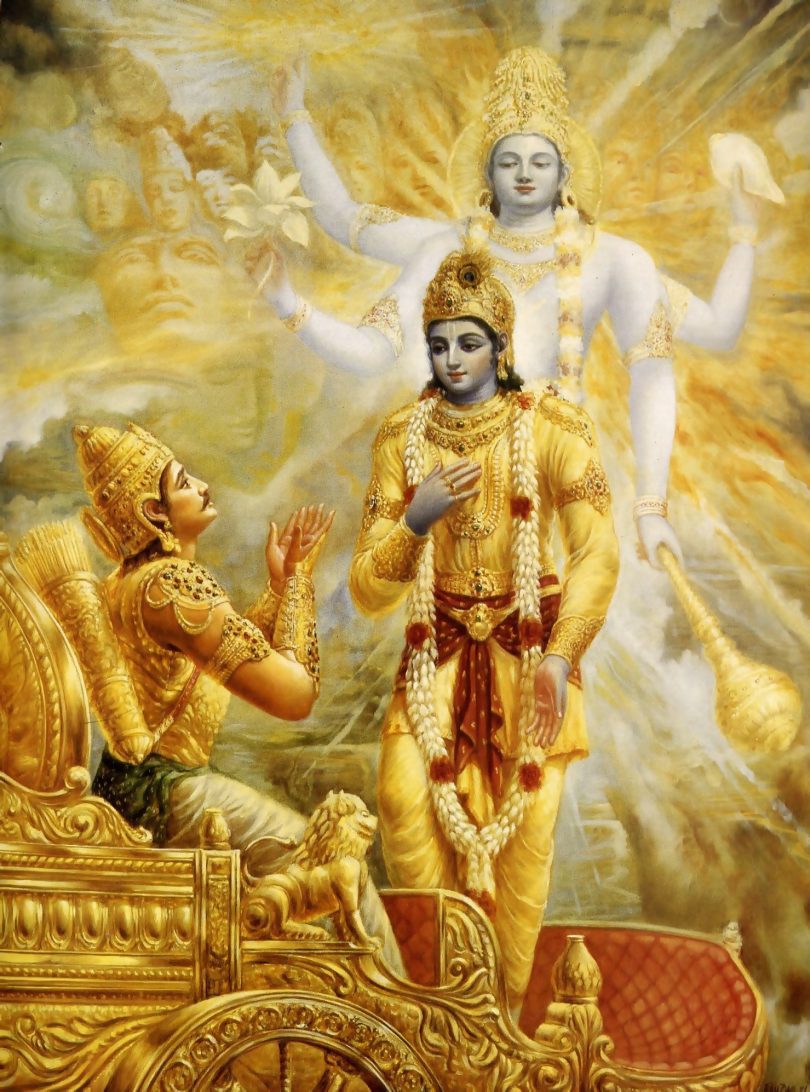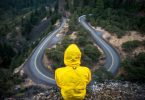After hearing Sanjaya’s brief description of Krishna’s Universal Form, we now hear Arjuna sharing his experiential realization of beholding the Universal Form sitting in one place. His experience can be summarized in 5 parts: what he sees at the present moment with the divine eyes gifted by Krishna, his realization about Krishna as the Supreme Absolute Truth, his emotions upon seeing such a wonderful form, his vision of the future, and a culminating submissive inquiry.
Vision of the present
- Demigods (devāṁs), Brahmā (brahmāṇam) sitting on the lotus flower (kamalāsana-stham), Lord Śiva (īśaṁ), and all the sages (ṛṣīṁś ca sarvān) and divine serpents (uragāṁś ca divyān) situated in the body (tava deva dehe). (BG 11.15)
- Many, many arms, bellies, mouths, and eyes, expanded everywhere. No end, no middle, and no beginning. (BG 11.16)
- The form is difficult to see because of its glaring effulgence, spreading on all sides, like blazing fire or the immeasurable radiance of the sun. (BG 11.17)
- This glowing form spans everywhere, adorned with various crowns, clubs, and discs. (BG 11.17)
- The cosmic form has numberless arms and the sun and moon are His eyes. There is blazing fire coming forth from the mouth, burning this entire universe by His own radiance. (BG 11.19)
- Although a single form, the form spreads throughout the sky and the planets and all space between. (BG 11.20)
- Filling (āpūrya) all the universe (jagat samagraṁ) with His effulgence (tejobhir), the form is scorching the universe (pratapanti) with terrible rays (bhāsas tavogrāḥ). (BG 11.30)
Realization of Krishna as the Supreme
- Krishna is the Lord of the Universe (viśveśvara). (BG 11.16)
- Krishna is the Universal (Cosmic) form (viśva-rūpa). (BG 11.16)
- Krishna is infallible or imperishable (akṣaraṁ). (BG 11.18)
- Krishna is the supreme knowable (paramaṁ veditavyaṁ) or primal objective. (BG 11.18)
- Krishna is the ultimate resting place of this universe (asya viśvasya paraṁ nidhānam). (BG 11.18)
- Krishna is inexhaustible (avyayaḥ). (BG 11.18)
- Krishna is the maintainer of the eternal religion (śāśvata-dharma-goptā). (BG 11.18)
- Krishna is the eternal Person (sanātanas tvaṁ puruṣo mato me). (BG 11.18)
- Krishna is without origin, middle, or end and His glory is unlimited. (BG 11.19)
- Krishna is the all-pervading Vishnu (viṣṇo). (BG 11.24, BG 11.30)
- Krishna is the Lord of lords (deveśa). (BG 11.25)
- Krishna is the refuge of the cosmic manifestation (jagan-nivāsa). (BG 11.25)
- Krishna is the most excellent God (deva-vara). (BG 11.31)
Emotional outbursts of Arjuna and the bystanders
- Seeing this wondrous and terrible form, all the planetary systems are perturbed. (BG 11.20)
- All the hosts of demigods are surrendering before the universal form and entering into Him. Some of them, very much afraid, are offering prayers with folded hands. (BG 11.21)
- Hosts of great sages and perfected beings, crying “All peace!” are praying to the universal form by singing the Vedic hymns. (BG 11.21)
- All the various manifestations of Lord Śiva, the Ādityas, the Vasus, the Sādhyas, the Viśvedevas, the two Aśvīs, the Maruts, the forefathers, the Gandharvas, the Yakṣas, the Asuras, and the perfected demigods are beholding the form in wonder. (BG 11.22)
- All the planets with their demigods are disturbed at seeing the great form, with its many faces, eyes, arms, thighs, legs, and bellies, and many terrible teeth; and Arjuna is disturbed too. (BG 11.23)
- Seeing the universal form (Vishnu) with many radiant colors touching the sky, His gaping mouths, and His great glowing eyes, Arjuna’s mind is perturbed by fear. He can no longer maintain his steadiness or equilibrium of mind. (BG 11.24)
- Arjuna lost the sense of directions (diśo na jāne) and could find no shelter (na labhe ca śarma) seeing (dṛṣṭvaiva) the dreadful teeth (daṁṣṭrā-karālāni ca) and His faces resembling the fire of death (te mukhāni kālānala-sannibhāni). (BG 11.25)
Vision of the future
- All (sarve) the sons of Dhṛtarāṣṭra (dhṛtarāṣṭrasya putrāḥ), along with their allied kings (sahaivāvani-pāla-saṅghaiḥ), Bhīṣma, Droṇa, and Karṇa (bhīṣmo droṇaḥ sūta-putras tathāsau) together with the best fighters on Arjuna’s side (sahāsmadīyair api yodha-mukhyaiḥ) are rushing into the fearful mouths of the universal form (vaktrāṇi te tvaramāṇā viśanti). Some are clearly seen (sandṛśyante) trapped between the teeth (kecid vilagnā daśanāntareṣu) with heads smashed (cūrṇitair uttamāṅgaiḥ). (BG 11.26-27)
- Just like (yathā) the many (bahavo) waves of the rivers (nadīnāṁ ’mbu-vegāḥ) run (dravanti) into the ocean alone (samudram evābhimukhā), all these great heroes of the world (tathā tavāmī nara-loka-vīrā) enter (viśanti) into the blazing (abhivijvalanti) mouths (vaktrāṇy) of the universal form. (BG 11.28)
- Arjuna could see all people entering (viśanti lokās) into the mouths (vaktrāṇi) of the universal form (tavāpi) at full speed (samṛddha-vegāḥ) for destruction (nāśāya), as (yathā) moths (pataṅgā) enter (viśanti) full speed (samṛddha-vegāḥ) into the blazing fire (pradīptaṁ jvalanaṁ) for destruction (nāśāya). (BG 11.29)
- Arjuna could see the cosmic form licking (lelihyase) and devouring (grasamānaḥ) all people (lokān samagrān) from all sides (samantāl) with His flaming mouths (vadanair jvaladbhiḥ). (BG 11.30)
Submission and Inquiry
- “Be gracious!” (prasīda). (BG 11.25, BG 11.31)
- “I offer my obeisances to you (namo ’stu te).” (BG 11.31)
- “I want to know about you (vijñātum icchāmi bhavantam), the primeval Lord (ādyaṁ).” (BG 11.31)
- “I do not understand (na hi prajānāmi) your actions (tava pravṛttim).” (BG 11.31)
- “Please explain to me (ākhyāhi me) who you are (ko bhavān) appearing in this fierce form (ugra-rūpo).” (BG 11.31)







